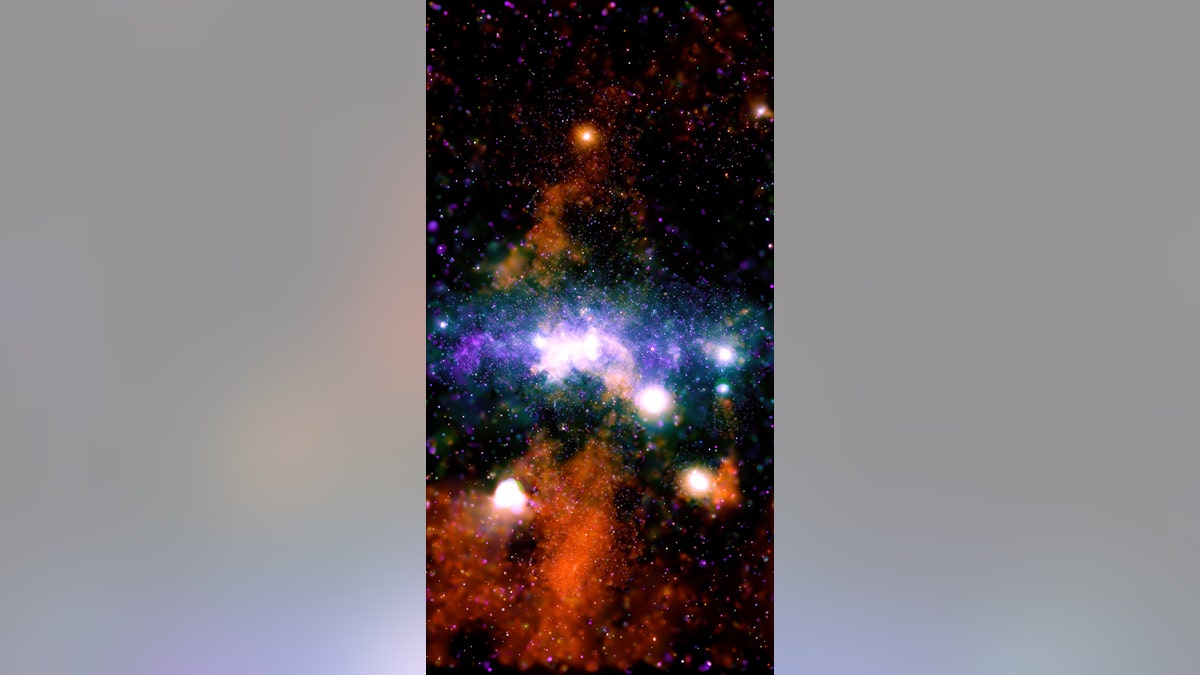NASA accurately calculates Milky Way’s weight
NASA has accurately calculated the Milky Way’s weight using Gaia and Hubble telescopes.
An amazing new view of the Milky Way provided by NASA's Chandra X-ray Observatory reveals the threads of superheated gas and magnetic fields that weave the cosmic tapestry together.
The panoramic X-ray view of the galactic center strings together 370 separate pointings of the orbiting telescope, building on previous Chandra observations over the past two decades.
BLOOD MOON LUNAR ECLIPSE ENTHRALLS VIEWERS
The MeerKAT radio telescope in South Africa also contributed to what Chandra describes as a multi-colored mosaic of data.
The composite depicts billions of stars and countless black holes in the center, or heart, of the Milky Way – 26,000 light-years away.

Massachusetts' Chandra X-ray observatory's view of the Milky Way's Galactic Center. (X-ray: NASA/CXC/UMass/Q.D. Wang; Radio: NRF/SARAO/MeerKAT)
Orange, green and purple X-rays are combined with gray radio data from MeerKAT, and the new version expands Chandra's high-energy view "farther above and below the plane of the Galaxy — that is, the disk where most of the Galaxy's stars reside — than previous imaging campaigns."
In a release accompanying the image, Chandra highlighted the significances of a "particularly intriguing" thread shown towards the bottom that has X-ray and radio emission intertwined and "points perpendicular to the plane of the galaxy and is about 20 light years long but only one-hundredth that size in width."
Upon further examination by the University of Massachusetts at Amherst's Daniel Wang, the properties of the X-rays and radio emissions reportedly suggest the features are "bound by thin strips of magnetic fields" in a process called magnetic reconnection.
Chandra explained that the process is like the phenomenon that drives energetic particles away from the sun, impacting space weather and riven by supernova explosions, outbursts of matter and close-quartered stars expelling hot gas.
"What we see in the picture is a violent or energetic ecosystem in our galaxy’s downtown," Wang said in an email. "There are a lot of supernova remnants, black holes, and neutron stars there. Each X-ray dot or feature represents an energetic source, most of which are in the center," Wang said in an email on Friday.
Wang's work – set to be published in the June issue of the Monthly Notices of the Royal Astronomical Society – shows large plumes of hot gas likely heated by supernova explosions and recent magnetic reconnections that extend for around 700 light-years above and below the plane of the galaxy.
CLICK HERE FOR THE FOX NEWS APP
While the observatory notes that reconnection events are "normally not sufficiently energetic to be detected in X-rays" and that those events could play a major role in heating gas between stars, accelerating particles to produce cosmic rays and helping to trigger star birth.
"The image shows that the magnetic threads tend to occur at the outer boundaries of the large plumes of hot gas. This suggests that the gas in the plumes is driving magnetic fields that collide to create the threads," the release said.
The Associated Press contributed to this report.










































